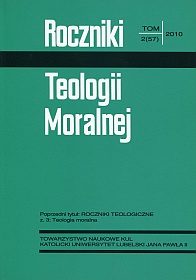Metodologiczne implikacje modeli eklezjologicznych w teologii moralnej społecznej
Abstrakt
The article presents a characteristic of defined ecclesiological models and it subjects to analysis their possible influence on some methodological questions in social moral theology, especially on the issue of the relation between the Church and the world. The dynamic changes within the Catholic ecclesiology during the recent century have resulted, inter alia, in working out several models of the relation between the Church and the world, sometimes ones excluding each other. The most important ones include models conventionally defined as theories of incarnationism (indirect participation), polarization (correlation), secularization (exclusivism), integral participation, critical participation, inglobalization (global absorption) and some trends of eschatologism. Analysis of the most important aspects of these theories or trends allows abetter comprehension of the great vitality and significance of the problem of relation to the world in the life of the whole Church, having also controversial elements and ones that may give rise to misunderstandings.
Bibliografia
Bartnik C. S.: Kościół Jezusa Chrystusa. Wrocław: TUM 1982.
Dianich S.: La missione della chiesa nella teologia recente. W: Associazione Teologica Italiana. Coscienza e missione di Chiesa. [Atti del VII Congresso nazionale dell'ATI]. Assisi: Cittadella 1977 s. 137-206.
Jan Paweł II: Encyklika Sollicitudo rei socialis. Watykan 1987
Mondin B.: La Chiesa, primizia del Regno. Trattato di ecclesiologia. Bologna: EDB 1986.
Sikorski T.: Teologia społeczna w kręgu problematyki teologicznej. W:W kierunku prawdy. Red. B. Bejze. Warszawa: ATK 1976 s.265-275.
Sikorski T.: Wokół projektu teologii społecznej. W: W kierunku chrześcijańskiej kultury. Red. B. Bejze. Warszawa: ATK 1978 s.86-102.
Winling R.: Teologia współczesna. Tł. K. Kisielewska-Sławińska. Kraków: Wyd. ZNAK 1990.

